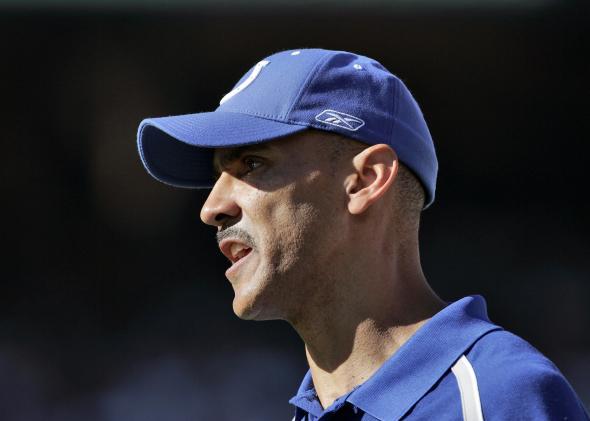Sam was drafted by the St. Louis Rams despite similar comments earlier in the year from NFL executives and coaches, mostly anonymous, who believed the rookie would “chemically imbalance” the locker room. For his part, Dungy believes Sam is a pro-caliber player, but wouldn’t want him on his team because of the inevitable controversy. This isn’t just unreasonable, it’s blatantly homophobic—a perfect example of the anti-gay animus that many LGBTQ people fear from their employers. It’s the reason why President Obama felt compelled to issue an executive order prohibiting anti-LGBT workplace discrimination.
Many—including, of course, Rush Limbaugh—have rushed to Dungy’s defense under the pretense that the media circus surrounding Sam is the “all of it” that he so vehemently wants to avoid. While off-the-field “distractions” can be toxic for professional sports teams, those legitimate problems include things like locker room harassment, dogfighting, drug use, and alleged murder. Overcoming adversity as an openly gay athlete is not a distraction, it’s an inspiration. As Pro Football Talk’s Michael David Smith put it, “If everyone refused to hire minorities because it could cause a distraction, no minority group would ever make any progress.” Dungy’s alternative, presumably, is for nobody to be the first openly gay player.
During the NFL combine this past February, Dungy suggested that Sam’s talent was all that mattered: “I don’t think there’s anything to handle. The NFL has always been … a meritocracy—that you’re judged on what happens on the field. It’s based on how you play.” So why would the former coach suddenly suggest that what happens off the field is more important?
It’s not clear what led to his change of heart, but it’s strange that Dungy, the first black coach to win a Super Bowl—hailed for breaking racial barriers—can’t see the irony in all of this. The man was recently hired by the Miami Dolphins to help deal with the aftermath of the Richie Incognito scandal, and has been praised by Time as the “moral conscience of football.” He openly acknowledges the racial barriers that hampered the NFL in its early years, comparing himself to Jackie Robinson and Fritz Pollard. Yet he seems to see no parallels in his anti-gay stances.
None of this comes as a surprise to the LGBTQ community, which is all too familiar with the former coach’s toxic beliefs. Back in 2007, shortly after his Indianapolis Colts won Super Bowl XLI, Dungy campaigned for a constitutional amendment banning gay marriage. During his tenure with the Colts, he made his religion a key focus, hosting hours-long pre-game chapel services and weekly Bible studies. At the time, Dungy was seemingly proud to champion discrimination, stating that he “embraced” the stance of homophobic organizations like the Indiana Family Institute. In 2012, Dungy tweeted his dismay with President Obama’s changing views on marriage equality. In 2013, he tweeted his disagreement with what he described as openly-gay NBA player Jason Collins’ “lifestyle,” carefully adding that “he should have opportunities like anyone else.”
Only homophobia can explain why Dungy would not extend that same kind of opportunity to Michael Sam.
Update, July 22, 2014, 2:45 p.m.: Dungy issued a statement clarifying his remarks to Pro Football Talk on Tuesday. He maintained that media attention surrounding the historic draft of the NFL’s first openly gay athlete is the “distraction” in question. “I gave my honest answer, which is that I felt drafting him would bring much distraction to the team,” Dungy said. “At the time of my interview, the Oprah Winfrey reality show that was going to chronicle Michael’s first season had been announced … I do not believe Michael’s sexual orientation will be a distraction to his teammates or his organization … My sincere hope is that we will be able to focus on his play and not on his sexual orientation.”
Confusingly, Dungy goes on to argue that we should give Sam an opportunity to prove himself as a player while simultaneously explaining that his own distraction-averse draft philosophy would preclude him from giving Sam that very chance. If this is true, it seems to be at odds with Dungy’s vocal advocacy for Michael Vick’s return to the NFL after that much-covered player served his sentence for involvement in a dogfighting ring.
